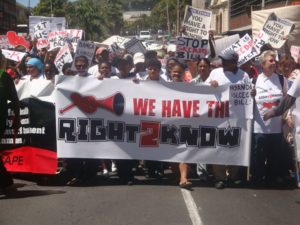Joint Statement: Ramaphosa must expand grounds for the Protection of State Information Bill parliamentary review!
The Right2Know Campaign , Media Monitoring Africa, amaBhungane Centre for Investigative Journalism, South African National Editors’ Forum and Ronnie Kasrils, former Minister for Intelligence Services have written to President Cyril Ramaphosa as a collective, calling on him to expand the grounds for the Protection of State Information Bill parliamentary review.
, Media Monitoring Africa, amaBhungane Centre for Investigative Journalism, South African National Editors’ Forum and Ronnie Kasrils, former Minister for Intelligence Services have written to President Cyril Ramaphosa as a collective, calling on him to expand the grounds for the Protection of State Information Bill parliamentary review.
We applaud President Cyril Ramaphosa’s decision to send the Protection of State Information Bill (the “Secrecy Bill”) back to Parliament, but we respectfully call on him to expand the grounds for reconsideration of its unconstitutionality.
The stark reality is that the protection of information held by the state is currently governed by apartheid-era legislation still on the statute books.
Parliament has twice – in 2008 and 2010 – attempted to introduce legislation intended to repeal and replace the Protection of Information Act, 1982.
These attempts were met by broad public opposition on the basis that those bills facilitated excessive degrees of government secrecy and, if passed, would violate the right to freedom of expression.
The second of these bills, in its eighth iteration and issued in 2013, has now been referred back to Parliament by President Ramaphosa for an unprecedented second time for reconsideration due to concerns about its constitutionality.
The undersigned signatories agree that, following the President’s referral, an opportunity has arisen to address the many unconstitutional aspects of the Bill. The overarching concern is the need to strike the appropriate balance between the genuine needs of state security against the rights to freedom of expression and access to information.
The signatories agree with all the grounds identified by the President in his letter to Parliament, which align with concerns raised by civil society at the time the current bill was enacted. We are particularly pleased that the President, like us, views the need for public interest and public domain defences as important.
However, there are more aspects of the bill that do not pass constitutional muster and our lawyers have written to the President requesting that he should refer further issues to Parliament for reconsideration.
These include:
- The Bill does not locate access to classified information within the framework provided by the Promotion of Access to Information Act, 2000 (“PAIA”). PAIA is the constitutionally-mandated mechanism through which to give effect to the right of access to state-held information.
- Due to the sensitive nature of classification decisions and the potential for them to impact on freedom of expression and access to information, appeals relating to unsuccessful requests for access to classified information should be made to the Classification Review Panel (“CRP”) rather than the relevant minister.
- The scheme of classification suffers from defects that go beyond the overbroad definition of “national security” and “state security matter”. The system of classification contained in the Bill must be revised such that it contains sufficient clarity, comprehensiveness and coherence so that those imbued with the power to classify use that power correctly and do not abuse it.
- The independence of the CRP should be strengthened and its role enhanced. Provisions relating to appointment and removal procedures, remuneration and the ability of the CRP to determine its rules should be revised to ensure that members of the CRP can exercise their powers impartially and without fear of recrimination.
- The criminal penalties contained in the Bill for possessing and disclosing classified information are unduly severe. Many of the offences in the Bill are overbroad and even criminalise conduct that should be promoted. Crucially, the Bill imposes extraordinarily harsh penalties for non-compliance that are out of sync with international norms and will have a severe chilling effect on the rights to expression and access to information.
- The transitional regime contained in clause 52 of the Bill creates uncertainty as to when certain provisions come into force and perpetuates the unconstitutional regime of classification under the Minimum Information Security Standards and the 1982 Act.
Most importantly, various versions in the Bill have been amended in a piecemeal fashion that has fundamentally undermined its coherence. As a result, the defective provisions of the Bill, when taken together, compound the potential for infringement of rights. Parliament therefore needs to reconsider the Bill as a whole and its potential to undermine constitutional rights and freedoms and to ensure that an amended version is internally coherent as well as being constitutional.
This should be done with reference to the Johannesburg Principles, which are regarded around the world as “authoritative standards clarifying the legitimate scope of restrictions on freedom of expression on grounds of protecting national security”.
The signatories remain committed to engaging on this important issue. To this end, we have written to President Ramaphosa as a collective, calling on him to send a further letter to Parliament, directing its attention to these concerns in addition to those raised in his previous letter.
In addition, the signatories call on the South African public to once again engage avenues of participation in the democratic process to ensure that the version of Bill that is eventually passed embodies a true expression of South Africa’s constitutional values, including a firm commitment to openness and transparency.
Issued by:
Media Monitoring Africa
amaBhungane Centre for Investigative Journalism
Right2Know Campaign
South African National Editors’ Forum
Ronnie Kasrils
#Ends


